- Home
- Mark Chadbourn
Jack of Ravens Page 3
Jack of Ravens Read online
Page 3
Sitting around in the village until the next drinking session would mean being alone with his thoughts. Activity was the only answer to keep the ache at bay. He took the opportunity of Etain’s immersion in her daily chores to slip out of the village and made his way over the grassland to higher ground.
Beyond the well-trodden area close to the settlement, the landscape became wild: long grass, rocky outcroppings, vast clusters of spiky yellow-flowered gorse and shadowy, near-impenetrable copses. Church enjoyed the exertion after the long days of recuperation. When he reached the high ground, he looked back towards the village, a small oasis of humanity in the wildness of nature. The land glowed green and gold in the morning sun. A symphony of whooshes and rustles and whispers soothed him as the Atlantic wind blew in, filled with the fragrance of growing things. Songbirds joined the wild melody, adding complex high notes. No discordant sounds, no sour odours of pollution. His senses had been numbed by modern living, but in that moment they came alive and he tasted a remarkable peace that he had never experienced before.
Jewelled butterflies and humming bees rose up from his path as he forced his way through the long grass towards his destination. As he neared, his mood darkened. On a hillock where a lone hawthorn tree had been twisted into the shape of a hideous old man by the blasting wind, he paused and looked around. He was sure this was the spot where he had glimpsed the peculiar burst of black fire. He didn’t know what he had expected to find, but his deep, secret mind wouldn’t leave him alone until he had gone there. From the hillock he had a clear view of Carn Euny, but it would not have been visible in the dark of the storm.
‘You shun your own kind.’
Church started at the voice. The seductive, honeyed tones came from a beautiful woman in a dark-green dress, her auburn hair blowing in the wind. Her skin had a rich, golden hue, but her features were hard. Church thought he saw a shadow of contempt in her expression. She sat on a rock, examining a pack of cards that she should not have had there, at that time.
‘Where did you come from?’ he asked.
The woman haughtily ignored Church’s question. ‘Have you turned your back on your own kind?’ she stressed.
Church shook his head, not understanding. ‘My own kind? You mean the people of Carn Euny?’
‘At the Second Battle of Magh Tuireadh, you fought with a courage and skill that surpassed those of the Fragile Creatures with whom you associate. You have moved beyond them now. Why should you stand with them?’
Church was stunned for a moment, as he tried to assimilate the woman’s words. ‘I fought at the battle—’
The woman sized him up. ‘You do not remember? You do not recall our meeting before the battle?’
Church shook his head. ‘We met?’
The woman’s forensic gaze held Church fast until he felt himself squirming beneath it. ‘I find you strange and troublesome,’ she said. ‘What is your name?’
Her attitude was irritating, but Church contained himself. ‘Jack Churchill. And you are … ?’
Her smile was unsettling. ‘You may call me Niamh.’
‘You’re from another village nearby?’ Church turned and scanned the area, knowing how well the roundhouses merged into the landscape. But there were no telltale smoke trails from any fires apart from the ones that hung over Carn Euny. When he turned back, Niamh was gone, and there was no sign of her anywhere nearby.
7
Church planned to ask Etain about Niamh, but she was soon forgotten as events unfolded. Despite the warmth of the summer day, he felt a growing chill. The memory of the burst of black fire blossomed in his thoughts like a sable rose. The spider in his arm felt as if it had settled deeper, and there was now a coldness running from it deep into his bones that made him feel vaguely nauseous. He would have to remove it soon, even if it meant carving it free with a knife. The maddening ache of his missing memories left him on edge, troubled by an itch he couldn’t scratch. All in all, he felt so thrown off balance that he couldn’t begin to see what he was going to do next.
When he arrived back in Carn Euny, he was surprised to find the residents in a state of mounting excitement. The children ran back and forth, in and out of each other’s houses, whooping and calling. The adults stood around, talking in quiet but animated voices.
Tannis was tethering his horse to the post near the communal house.
‘What’s got everyone so worked up?’ Church asked.
Tannis pointed to the east. Beneath the glare of the sun, Church could just make out a figure in the distance, slowly walking towards Carn Euny.
‘Druidae,’ Tannis said with a subtly nuanced smile: there was respect, certainly, but also apprehension, perhaps even fear.
As the figure approached, Church gradually made out a man in his mid-fifties, dressed in olive-coloured robes splattered with the mud of his journey. He used a staff to propel his forceful pace. His hair was chestnut brown streaked with silver, wild and untamed, his beard incongruously clipped and tidy.
When he reached the edge of the village, three elders greeted him with deference, a quiet word and a slight bow. He barely acknowledged them. Instead, his eyes swept back and forth across the gathered crowd, his face steely. He muttered something. One of the elders turned and pointed directly at Church.
The children gathered in silence and followed as the elders ushered the druid into the meeting house. Everyone waited outside the door, only whispers passing amongst them.
‘He’s come for me, hasn’t he?’ Church said.
Tannis’s reaction was unsettling in its simplicity. His smile faded and he placed a reassuring hand on Church’s arm. ‘Stay true to yourself, brother. That is the only advice I can give.’
Church wandered over to sit on the grassy knoll just beyond the village boundary. The sun warmed him, the whisper of wind in the grass as soothing as ever, but the idyllic setting no longer worked its magic on his troubled mind.
As he brooded, Etain came up and sat quietly beside him.
‘You did a good job of keeping me here until your grand inquisitor could arrive,’ Church said.
‘We have to be sure,’ Etain said, though there was a hint of regret behind her words. ‘We can no longer be at the mercy of those who would trap us in hardship and suffering.’
Church wondered what the druid’s plans were. Torture? He didn’t believe that, though the Romans attributed brutal practices to the druidic class. In truth, the druids had much in common with the Hindu Brahmans, an intellectual caste that encompassed both learning and priestly traditions. Druids insisted that all their knowledge was passed down orally so it wouldn’t fall into the wrong hands, and that practice had left a void at the heart of their history. Some academics even argued that the druids came from a culture that preceded the Celtic tribes, bringing with them an ancient knowledge that had elevated them to a place of respect amongst the Keltoi. Church placed his hope in the belief that if they were intellectuals they would not resort to violence. But this was a hard, bloodstained world and he couldn’t be sure. At least he had his sword, which quietly hummed its pleasant song to him from where it hung against his thigh.
‘Do not be afraid,’ Etain said, as if she could read his thoughts. Her hand crept to rest on the back of his, and when he looked at her, her eyes were dark and numinous. ‘I have belief in you.’
They were interrupted by a tall, elderly man. ‘Your presence is requested,’ he said to Church.
The druid sat in the centre of the meeting house, next to the fire, drinking heartily from a jug of the strong alcoholic beverage and gorging on dried meats and fruits from the village store. He motioned to a rush mat opposite. ‘Sit,’ he said with his mouth full, then waved his hand furiously until all the villagers had vacated the building.
When they were alone, he studied Church over the rim of his cup and then wiped his beard with the back of his hand. ‘My name is Conoran,’ he said, ‘and you are Jack, Giantkiller, also known as Church.’
‘I am.
And you are here to test me.’
Conoran smiled and nodded. ‘Good. Then the land is clear and the skies blue.’ Conoran’s eyes were still unreadable, but there was a warmth in his gaze that put Church more at ease.
‘You want to know if I’m one of the gods’ agents sent here to spy on you, or just a man.’
‘There is no just, little boy. A mortal is a good thing to be. The most important thing.’
‘How are we to go about this? An interrogation?’
Conoran mused while he sipped on his drink. ‘Let us talk. You walked out of the morning mists into the world of man carrying the sword of Nuada Airgetlamh – the weapon of a god. And it speaks to you … and it is yours. You slew one of the great giants of Kernow, made of earth and tree and the great green heart of the wild, constructed of the very stuff of the world. You slew it, yet no man has ever been able to slay one of the giants of Kernow before.’ The druid ended with a broad smile.
Church considered his comments and replied, ‘When you put it like that …’
Conoran laughed. ‘My kind have a secret name,’ he said. ‘Amongst ourselves, we are called the Culture. We existed long before the tribes and we shall be here long after they are gone. Our knowledge is beyond your imagination …’ He paused, tugged gently at his beard. ‘Or perhaps not. You are not of this place, little brother. You use our words, but speak with a strange voice. Your skin is soft, your hands uncalloused. Your garments are beyond the ability of even our most skilled weavers—’
‘And you think that makes me a spy from the gods,’ Church began his argument, but Conoran raised a silencing hand.
‘The Culture has a long memory, and our knowledge is great. We can recognise a mortal when we see one. You are mortal, but you are … strange. I would say there is something special about you, little brother. Something that is mortal, yet more than mortal. A quality … a light shining out of you. And in my eyes, it is blue.’
Church felt a shiver of recognition at the druid’s words, but frustratingly it originated in the part of his memory that had been locked off.
‘You are not like us, yet you are like us,’ the druid continued. ‘You are not from the gods, yet you are not from this world. Speak. Tell me the truth. Now.’ The firelight reflected in his eyes.
‘I am from this world.’ Church paused, considered how best to continue, then leaned forward and scratched a line in the hard-packed-mud floor. ‘Time,’ he said, glancing at Conoran to see if he understood the concept. The druid’s expression suggested he did. Church etched a point on the far left of the line. ‘Here we are now, you and me, talking.’ He scratched another point on the far right. ‘Here is my home. I have no idea how I got from there to here.’ He tapped his head. ‘A lot of my memory has been wiped away.’
Conoran nodded thoughtfully. ‘Space and time are prisons that we all need to escape. You have achieved a great thing.’
Church fought back a swell of emotion. ‘I don’t care. I just want to go home.’ Another flash of Ruth, her face strong and defiant.
‘Show me your arm.’ Conoran gestured to where the black spider nestled in Church’s flesh.
Church removed his shirt and Conoran examined the thing without touching it, his expression dark. Finally he sat back and said, ‘There is much mystery here. The mists must be rolled back. Remember: nothing happens without a reason. You are here for a reason. That thing is in your arm for a reason. A great plan is unfolding, but we can see only one tiny part of it.’
‘So I’m accepted?’ Church replaced his shirt.
Conoran ignored his question. ‘First we must remove that creature. I will make arrangements.’
He marched out of the room without a backward glance.
8
It was a perfect summer night, bright and balmy from the heat of the day, with a million stars glittering overhead and the moon as bright as a lantern. A soft breeze occasionally brought scents of the cooling countryside.
Carn Euny had been transformed. Torches blazed along the main thoroughfare, the flickering shadows making the village hazy and unreal. Church stood with the community silent at his back. The atmosphere was pregnant with anticipation.
Finally Conoran emerged from a nearby house where he had been performing his ritual of preparation. With a flamboyant gesture, he tossed a handful of leaves and twigs onto a small fire that blazed at the head of the street. There was a brief flash accompanied by a murmur of awe from the crowd, and then a heavy aroma filled the air. It reminded Church of incense.
‘Are you prepared for the journey into the world beyond?’ Conoran asked Church solemnly.
Church nodded. When he had agreed to the ritual he had expected it to be a diverting piece of entertainment, but he was surprised by how affecting it truly was. Every nerve in his body felt electrified.
Conoran held his hand out, palm upwards. On it lay a small pile of dried mushrooms. Church knew that many ancient cultures used some kind of hallucinogen to enhance the religious experience – even the early Christian sects were supposed to have used psychedelic mushrooms in their rituals – but he was apprehensive about their effect.
‘Take them,’ Conoran urged, with a flinty tone that suggested there could be no refusal.
Church reticently popped the mushrooms into his mouth and swallowed. At his back, someone began to bang a drum of animal hide, then another, and another. The sharp notes of a bone flute rose up.
As the rhythmic music built, Conoran led the procession through the settlement, Church close behind him. It ended at the entrance to a mysterious tunnel that Church had inspected earlier. It was a fogou, a feature of several Cornish Iron Age settlements; archaeological debate about their use ranged from a grain store or shelter from marauding enemies to some ritual purpose. Church now knew it was the latter.
Conoran motioned to the dark hole. ‘Enter now, and be prepared to be born into a new world and a new life.’
Church felt a flicker of anxiety as the first flush of the mushrooms hit his system. Lying on his belly, he slithered like a snake into the dark.
The tunnel opened into a larger space, but not high enough to stand upright. The darkness was so intense it had a palpable quality; Church felt as if he was floating in space. He became acutely aware of the beat of his heart and the rush of blood through his arteries and veins.
‘Move along the tunnel.’ Conoran’s disembodied voice floated eerily around.
Church edged forward, one hand outstretched in front of him, the other dragging along the cold stone corbels of the wall for guidance. He worried that there might be some secret pit ahead, that the whole ritual was an elaborate trap to rid the community of the dangerous stranger in their midst.
The tunnel turned this way and that, or appeared to in the dark, so that Church could no longer recall the way out. Eventually he came to a place where the roof and floor came together to form a funnel.
‘Crawl into the gap.’
Church jumped. Conoran was right behind him.
Church crawled until he was wedged in a foetal position inside a tiny chamber, and there he realised the significance of Conoran’s words about being born into a new world. The tunnel acted symbolically like the birth channel. After the ritual he would emerge into the light, to start a new life after the mind-altering experience.
The drums throbbed distantly like the slow beat of an enormous heart. The sound of the bone flute ebbed and flowed like the thrum of a vascular system.
‘Jack, Giantkiller, known as Church. Let me tell you about Existence,’ Conoran began in measured tones. ‘There is one rule in our secret studies, and it is this: no here or there exists, no in or out. There is only us. Everything you see in the world around, every rock and tree and blade of grass, is fluid. The world is only the way you perceive it because that is how we need it to be, at this moment. We make our own world.’
‘You’re saying this is all just a dream,’ Church said languorously. He felt strangely like laughing. ‘We dream the wor
ld this way.’
‘All living things are a part of Existence. The Blue Fire burns in everything, roaring through like life’s-blood.’
Church had a strange vision: standing on a balmy night, looking over the rolling countryside as streams of Blue Fire raced across the grass in lines, interlinking, forming a huge grid that echoed inside him as much as without.
‘The Fiery Network,’ he muttered.
Was it a dream, or had he truly experienced this, the memory now lost to the abyss in his head?
‘You know of this,’ Conoran said, pleased. ‘I knew that would be the case. It is secret knowledge, passed down only through the Culture, yet you know. The lines of power run through the earth, from stone circle to cromlech, from sacred spring to hilltop. And the lines run through us, too. They are the source of all magic. They are our inspiration, and our defence against the forces that would destroy us.’
‘Ley lines,’ Church muttered. He was starting to drift.
Conoran continued with renewed vigour. ‘Then know this: Existence has another side, as dark as the Blue Fire is bright, as filled with despair and dread as we are filled with hope. From this darkness spring forth the Formorii, the shape-shifting monstrous enemy of the golden-skinned Tuatha Dé Danann. And the black spider, even now crawling from your arm into your very soul, is from that darkness, too.’
Church felt a chill run deep into his heart, though he didn’t fully understand Conoran’s words. The spider in his arm squirmed sickeningly.
‘Why is it attacking me?’ Church said. He grew nauseous at the insistent wriggling in his flesh. The spider was becoming more active, as though it sensed a threat. Church’s thoughts fragmented, his memory grew dim around the edges, and the abiding cold consumed everything.

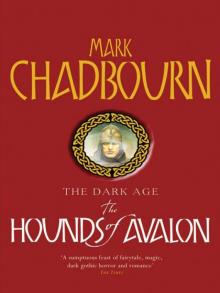 The Hounds of Avalon tda-3
The Hounds of Avalon tda-3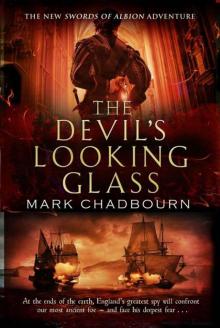 The Devil's Looking-Glass soa-3
The Devil's Looking-Glass soa-3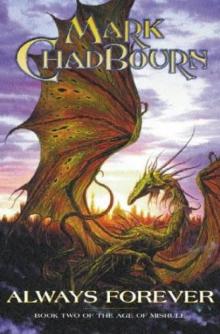 Always Forever taom-3
Always Forever taom-3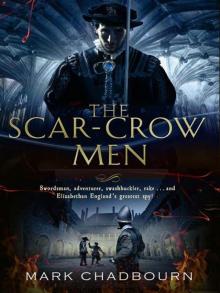 The Scar-Crow Men
The Scar-Crow Men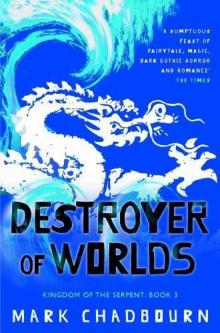 Destroyer of Worlds kots-3
Destroyer of Worlds kots-3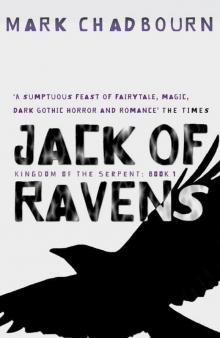 Jack of Ravens kots-1
Jack of Ravens kots-1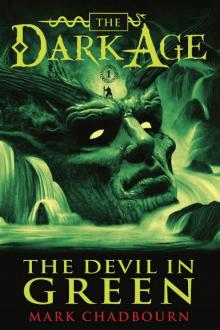 The Devil in Green
The Devil in Green World's End
World's End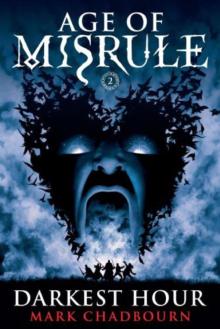 Darkest Hour (Age of Misrule, Book 2)
Darkest Hour (Age of Misrule, Book 2) Destroyer of Worlds
Destroyer of Worlds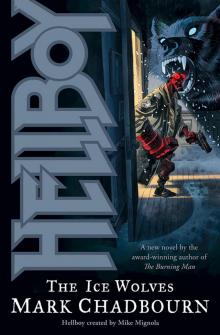 The Ice Wolves
The Ice Wolves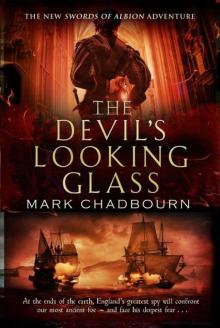 The Devil soa-3
The Devil soa-3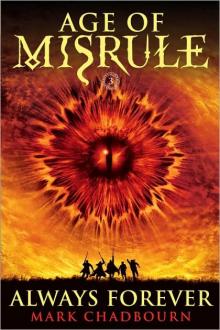 Always Forever
Always Forever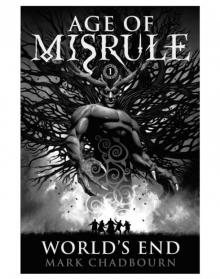 World's End (Age of Misrule, Book 1)
World's End (Age of Misrule, Book 1)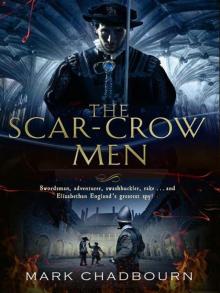 The Scar-Crow Men soa-2
The Scar-Crow Men soa-2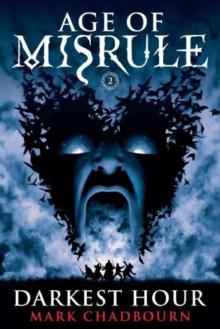 Darkest hour aom-2
Darkest hour aom-2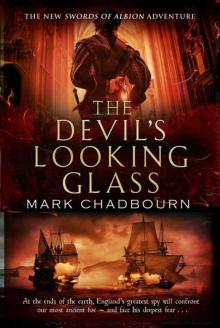 The Devil's Looking-Glass
The Devil's Looking-Glass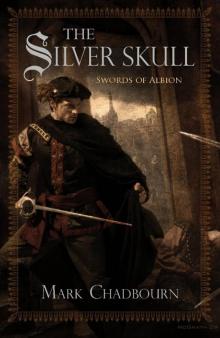 The Silver Skull
The Silver Skull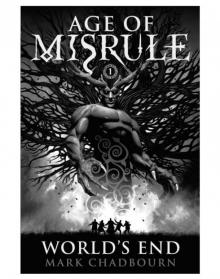 World's end taom-1
World's end taom-1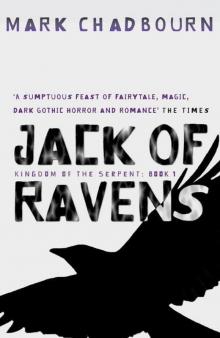 Jack of Ravens
Jack of Ravens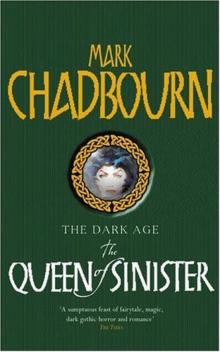 The Queen of Sinister
The Queen of Sinister